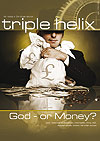For you know the grace of our Lord Jesus Christ, that though he was rich, yet for your sakes he became poor, so that you through his poverty might become rich.
(2 Corinthians 8:9)
Now this was the sin of your sister Sodom: She and her daughters were arrogant, overfed and unconcerned; they did not help the poor and needy...
Therefore I did away with them....
(Ezekiel 16:49-50)
The city of Sodom is associated in most people's mind with sexual immorality but the prophet Ezekiel also links it with selfish absorption in material things and neglect of the poor. The stark contrast with the financial ethics of the Lord Jesus Christ is beautifully encapsulated in the biblical quotes above. The challenging question it poses of us is, Which verse best describes us as Western Christians today? Do we imitate Christ or Sodom?
If your net worth is a mere £270,000 (ie you own an average house) then you are in the top 1% of the world's population. The average member of the top 1% is 13,000 times richer than those with the mean wealth of the bottom 10%. (1)
Yet despite the huge wealth in Britain we are one of the world's most indebted countries. (2) Total UK personal debt at the end of September 2009 stood at £1,459bn. The public sector net debt was a further £824.8bn, equivalent to 59% of gross domestic product; about £33,000 per household. It will be £1,400bn in 2013-2014 (79%). As the writer of Ecclesiastes puts it, 'Whoever loves money never has money enough'. (3) In other words UK public plus personal debt in 2013 will be about £3,000bn – enough to give every one of the world's 3 billion poorest people (who currently earn less than £2 per day) (4) £1,000 each.
Reading Huw Morgan's challenging article on money (pp 6-7) has led me to re-examine the Bible's teaching on this matter. It is refreshingly clear. Scripture tells us that everything ultimately belongs to God who provides generously to us (5) in order that we can meet both our own needs and also those of others. (6) In so doing we bring glory to him. (7) Our use of money reveals our real priorities. (8) The key spiritual secret is to learn contentment. (9) The love of money is a dreadful spiritual snare (10) which leads to judgment. (11)
Money can disappear quickly (12) – as the banking crisis has poignantly reminded us – but its proper use can be a great blessing. (13) Gospel economic ethics are radical: 'Lend even to your enemies without expecting to get anything back'; (14)
'Sell your possessions and give to the poor'; (15)
'Be generous and willing to share'. (16)
'It is more blessed to give than to receive', says Jesus. (17) Christian giving should be generous, sacrificial, cheerful, regular, proportionate. (18) Furthermore it carries the amazing promise that God will provide for our needs. (19) We should give to extend God's Kingdom, (20) to those who teach or minister, (21) to needy Christians here and abroad, (22) to family and relatives, (23) to the poor in general, (24) and in fact to anyone in need. (25) Real Christian service (26) goes beyond Old Testament legalities such as the tithe. (27) If necessary to meet needs, assets should be sold too! (28) Saving is, of course, not wrong but it comes after our priorities in giving and providing for our families are met.
It is right to prepare for seasonal shortfalls and cashflow irregularities (29) and also for calamities and anticipated needs, (30) especially those of family. (31) But we also need to question how we save and review it regularly asking such questions as: For what reason am I actually saving this money? What is the money being used for in the meantime? Who is being helped by it?
How often do we hear it preached today that Christians should lend at no interest and forgive debts? But it is very clearly there in the Bible. (32)(33) 'If you love me, you will obey what I command' (34) says the Lord Jesus.
When I was a houseman my Christian registrar gave me some advice: 'Be like a missionary', he said. 'Live simply, give generously and never go into debt to buy anything.' He might have added, 'Save sensibly and ethically and give tax-efficiently'. I took his advice to heart then and there and it has been a lifesaver. Just a handful of simple decisions have enabled us as a family to live debt and mortgage free for over 20 years. And yet when I look back and read the testimonies of Christians who have taken Jesus' words far more seriously than I have, I actually wish I had been less like Sodom and more like Jesus.
































